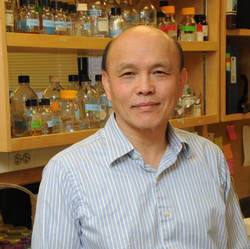Call Now Open
2026 Oxford-Harrington Rare Disease Scholar Award

Infectious Disease
Development of a Small-Molecule Therapeutic that Prevents Drug Resistance in Staphylococcus Aureus, A Common Cause of Community and Hospital-Acquired Infections
2017 Harrington Scholar-Innovator
Dr. Cheung plans to progress the small molecule DNAC23a or its analogs through preclinical studies to identify its target in methicillin-resistant S. aureus (MRSA), study its pharmacodynamics and develop the optimal compound for further testing.
The Cheung lab screened 60,000 small molecules and identified DNAC-2 as a compound that inhibited the growth of MRSA. One of its analogs, DNAC-23a, appears to have synergistic killing activity with oxacillin, a form of penicillin commonly given to treat Staph infections, but its target and toxicity were unknown. With Harrington Discovery Institute support, Dr. Cheung believes he can move DNAC-23a and its analogs to a Phase 1 trial.
“As an infectious disease physician, I have been aware of the problem of drug resistance. We know that many drugs that were effective are no longer useful in treating infections such as Staph aureus.” “The question was whether we could find a compound that would work with existing drugs that used to be effective to make them effective again. In this case, we have found a compound that we can combine with oxacillin and be effective in MRSA.”
“Being an MD researcher, I bring a different perspective to research. I try to do research that is useful. I am always looking for things that make a difference to patients.”
Source: Article from 2017-18 Annual Publication.